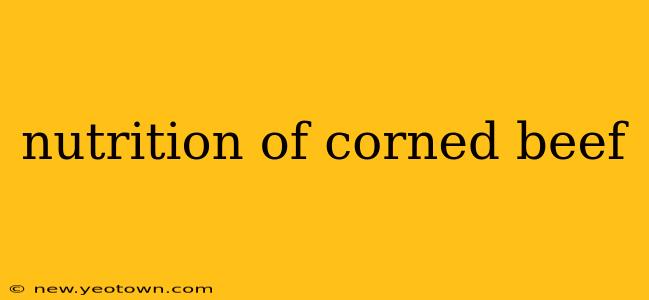Corned beef. The very name conjures images of St. Patrick's Day feasts, overflowing platters, and perhaps, a slight hesitancy regarding its nutritional profile. But the truth is, corned beef, while certainly not a health food in excess, offers a surprising nutritional punch when consumed in moderation and as part of a balanced diet. Let's embark on a journey to uncover the nutritional secrets hidden within this savory delight.
Our story begins, not in a bustling kitchen, but in the heart of a butcher shop. The transformation of a humble brisket into corned beef involves a curing process using salt, nitrates (often for preservation and color), and spices. This process, while undeniably impacting the nutritional makeup, doesn't entirely negate the inherent benefits of the beef itself.
What are the nutritional benefits of corned beef?
Corned beef, primarily sourced from beef brisket, is a good source of protein, essential for building and repairing tissues. A single serving (around 3 ounces) provides a significant chunk of your daily protein needs. This protein is crucial for various bodily functions, from muscle growth to hormone production. Moreover, it's a relatively good source of certain B vitamins, notably B12, crucial for nerve function and red blood cell formation. Iron is also present, contributing to oxygen transport throughout the body.
Is corned beef high in sodium?
Yes, this is a major consideration. The curing process heavily relies on salt, leading to a significantly high sodium content. This is arguably the biggest drawback of corned beef. Excessive sodium intake is linked to high blood pressure and other cardiovascular issues. Therefore, mindful consumption is key.
How much sodium is in corned beef?
The exact sodium content can vary depending on the brand and preparation method. However, a typical 3-ounce serving can easily contain over 1000mg of sodium – a substantial portion of the recommended daily intake. Always check the nutrition label on the packaging for precise figures.
Is corned beef healthy?
This is a nuanced question. Corned beef isn't inherently "unhealthy," but it shouldn't form the cornerstone of a balanced diet. Its high sodium content necessitates careful portion control and mindful consideration within your overall dietary intake. It's best enjoyed as an occasional treat rather than a daily staple.
What are the health risks associated with eating corned beef?
The primary health concern surrounding corned beef is its high sodium content. Excessive sodium intake can contribute to hypertension, increasing the risk of heart disease and stroke. Additionally, the nitrates used in the curing process have been linked to potential health risks, although research in this area is ongoing and the amounts used are generally considered safe in moderation.
How can I reduce the sodium content of corned beef?
Several strategies can help mitigate the high sodium content:
- Trim visible fat: This reduces overall calorie and sometimes sodium content.
- Rinse before cooking: Rinsing the corned beef under cold water can help remove some excess salt.
- Choose low-sodium options: Some brands offer lower-sodium versions of corned beef.
- Control portion sizes: Sticking to recommended serving sizes is crucial.
- Balance your diet: Ensure your overall diet is rich in fruits, vegetables, and whole grains to offset the sodium intake.
In conclusion, corned beef offers some nutritional value, particularly in terms of protein and certain B vitamins. However, its high sodium content demands careful consideration. Enjoy it in moderation as part of a balanced diet, and always be mindful of portion sizes. By making informed choices and practicing moderation, you can savour this festive favourite without compromising your health.

